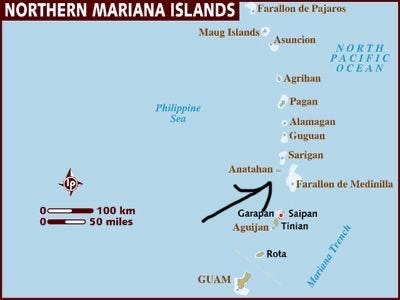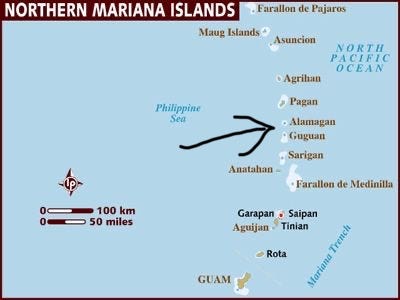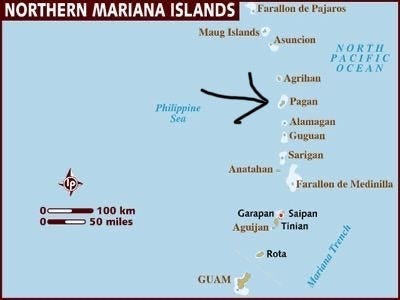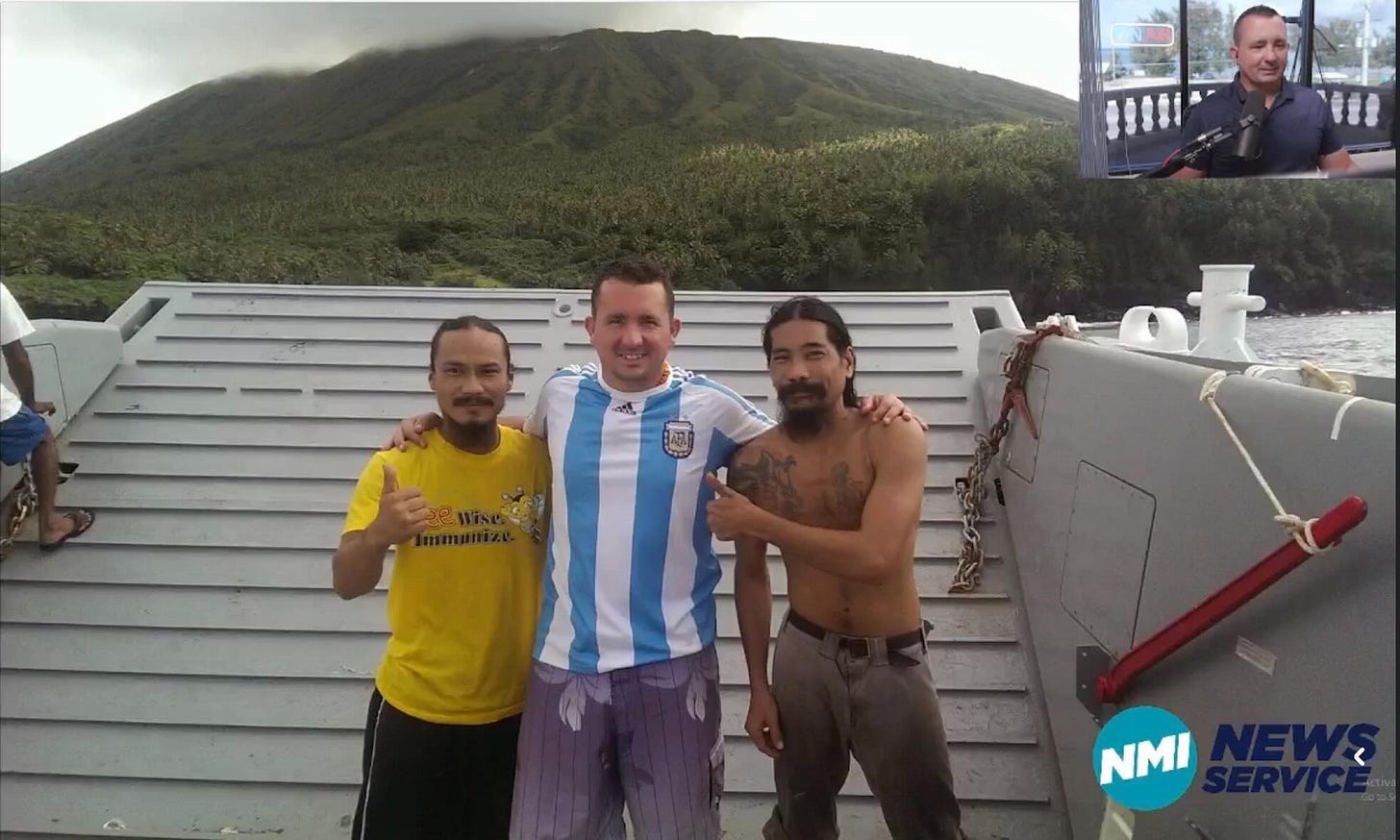Civics from Saipan
Some hopefully inspirational and hopeful observations about the first voting of Election Day.
I spent the day exploring Election Day 2024 in the Commonwealth of the Mariana Islands, where the first votes are cast and the first polls close in America.
In my professional life and on this blog, I often reflect on things that the CNMI could learn from the mainland to help improve the lives of its residents. But in my personal life, I am constantly reflecting on what lessons the mainland could adopt from our youngest jurisdiction. I want more Americans to know about this place, the most interesting place in the world. There are some policy and cultural practices around elections that stood out to me.
Most of my readers are going to be spending the day exhausted, cynical, scared, and angry about the entire project of American governance. This is not a criticism; I have been dwelling in those waters for more than a decade. Perhaps hearing about how passionately and jubilantly our newest jurisdiction celebrates and exercises the franchise will provide a bit of solace and hope. It certainly did for me.
I have written a basic primer on the Commonwealth of the Northern Mariana Islands before. For the purposes of U.S. representation, it has a non-voting member of the House of Representatives, like the other non-state places outside of continental North America: Puerto Rico, U. S. Virgin Islands, American Samoa, and Guam. It has a does not have a seat in the Electoral College, unlike D.C., so residents do not vote.
Election Day is an official holiday here. If private businesses choose to remain open, they are required to give every employee two hours to go vote, paid. Both of these policies should be adopted everywhere in America.
The day almost always concludes a 4-day weekend. This is because November 4 is Citizenship Day:
“in recognition of the fact that on that day in 1986 the Covenant to Establish a Commonwealth of the Northern Mariana Islands in Political Union with the United States of America goes into full force and effect and the people of the Northern Mariana Islands become citizens of nationals of the United States, thereby realizing the aspiration of nearly forty years for political self-determination.”
Governor Pedro A. Tenorio, who wrote these words in his signing statement, continued:
“This bill is one of the most significant legislation since the inception of the Commonwealth. We had anticipated that the Termination of the Trusteeship would take place during 1981. Today marks a milestone in the history as out citizens are now full-fledged citizens or nationals of the United States and are able, for the first time, to receive the benefits contained in the Covenant.”
The pride that the CNMI has in its elections is palpable. Because of its isolated location, legal framework, and unique labor and immigration history, the CNMI is unique among American jurisdictions in having a greater population of noncitizen residents than citizen. But nearly all of the eligible voters are registered, totaling 18,400 registered voters. Voter turnout is normally around 80%.
The Commonwealth works to make voting as easy as possible. There are 10 polling stations on this island, home to 95% of the population. There are substantial accessibility laws, laid out in endless PSAs, that describe exactly what the rights are for people affected by mobility and other disabilities. Health problems of that kind are ubiquitous here, so the Commonwealth has put in considerable effort to assist where it can.
The campaigns have a certain O Brother Where Art Thou? quality to them. Motorcades of trucks with trailers and loudspeakers circle the island. At each of the polling stations the candidates and parties assemble supporters to spend all day outside waving and honking their horns.
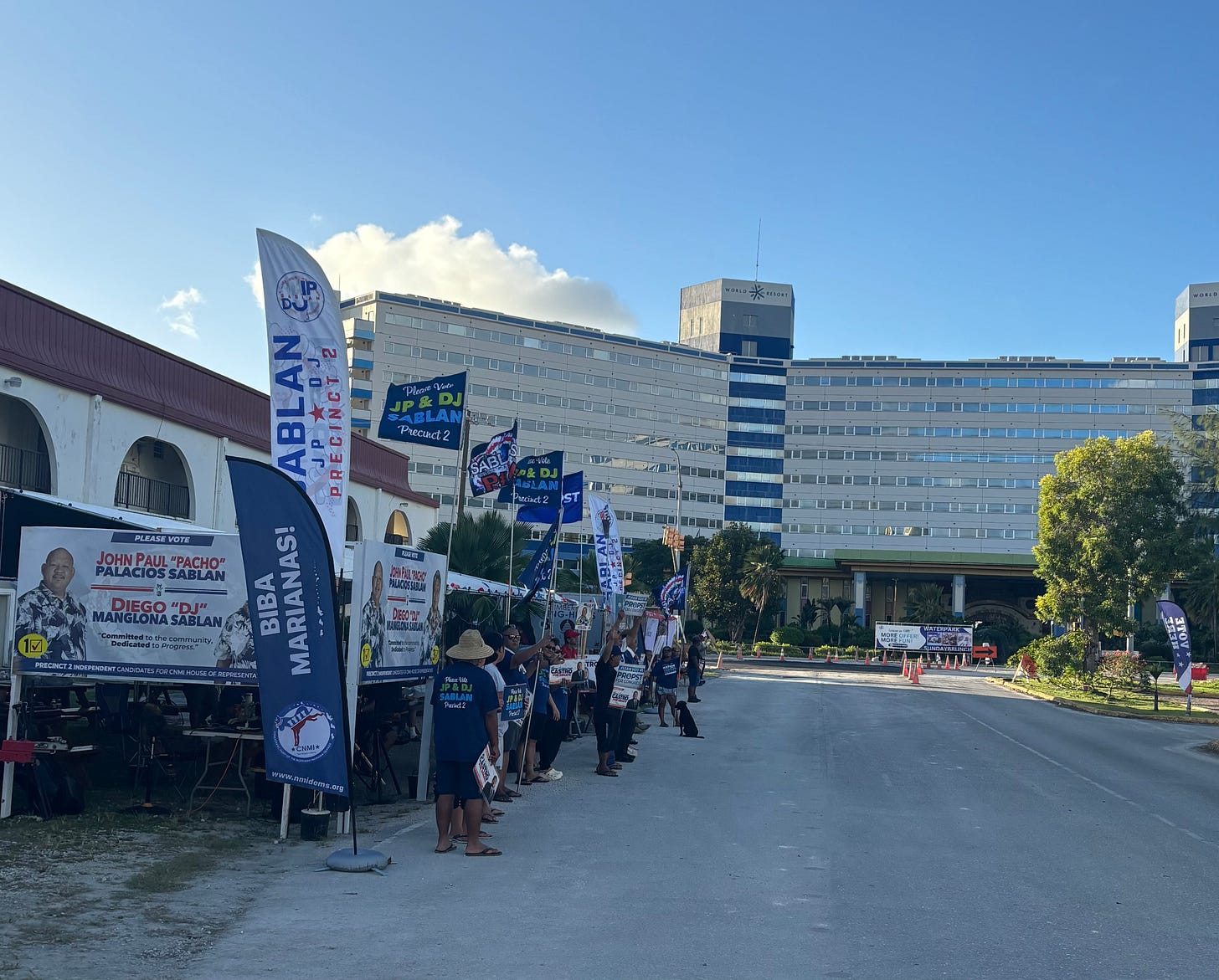
I was skeptical of what all the honking and waiving signified, but apparently it is a really palpable gauge of support. One of the Guam delegate candidates had an entire campaign ad song about waving and honking.
There is also a recurring incredible operation for each Election Day: The Northern Islands. The CNMI consists of Saipan, Rota, and Tinian, but there are also 11 more islands north of Saipan, collectively known as the Northern Islands. Most are inhospitable, rocky high volcanic islands. In ancient Chamorro times, they were inhabited. In the late 17th century, the Spanish carried out a reduccion known as the ‘Spanish-Chamorro Wars.’ This emptied all of the islands north of Guam of surviving Chamorros. In the intervening centuries, and especially since the CNMI was founded, there have been at least some residents trying to make resettlement happen on Anatahan, Agrigan, Alamagan, and Pagan. The Mayoralty of the Northern Islands, located in absentia in Saipan keeps track of who is on the islands at any time.
Anatahan, only 65 miles Northwest of of Saipan, is the site of the final organized Japanese resistance of WWII. About 30 survivors of three Japanese war wrecks survived there until they surrendered in 1951. The holdouts were led by the last surviving woman, Kazuhiro Higa. Until 1990, the island was permanently inhabited. Volcanic activity led to the evacuation of the permanent population, though a few people return occasionally in efforts to reestablish a presence there.
Alamagan, 120 miles from Saipan, was evacuated in 1998 because of volcanic activity, but many of the descendants of the village that was populated during the German and Japanese periods hope to repopulate it. In the 2020 census, there was a single resident.
Agrigan (or Agrihan) is the furthest north of the populated islands. Intermittent Hawaiian, German, and Japanese commercial efforts established small settlements there. After World War II, the population was under 100 until driven away by the same spate of 1990 volcanoes. In the 2020 census, there were 4 residents.
The largest of the Northern Islands is Pagan (pronounced PAW-gun). At its largest in modern times, there were thousands of residents. Before a garrison of the Japanese Imperial Army arrived to fortify the island, it was a productive copra station. Pagan was passed over, along with Rota, in Operation Forager. The stranded Japanese, after hundred starved of malnutrition, ultimately surrendered at war’s end. In 1981, Mt. Pagan exploded. Regular volcanic activity for the following four decades has made consistent resettlement efforts difficult.
Most of the Northern Islanders vote early or absentee, but if there is a population on one of the islands on election day, the Commonwealth Election Commission arranges for an election monitor to travel to whichever island has a population to administer the election and then return with the ballots. A colleague of mine rode the several hundred mile circuit yesterday on a Coast Guard cutter, usually patrolling for distressed ships. Six voters from the islands of Pagan, Alamagan, and Agrihan were collected and duly reported to be included in the total.
I am a pretty sentimental guy, especially when it comes to stories about everyday people doing common acts of courage or sacrifice for the sake of high principles. The stories I’ve been collecting about the lengths that the voters and poll administrators take to make sure that their right to vote is honored give me overwhelming patriotism tingles.
I know that it’s cliche to be “rah-rah America!” for a Southern Frat Rat Eagle Scout who measures the Star-Spangled clothing in his wardrobe not by article but by percentage. But it has been more than a century since anyone that I am descended from has been unable to vote. Many of the people here, however, were already adults before they had the franchise. And their right doesn’t even include an Electoral College vote or a voting delegate to Congress. It stirs my heart, deeply.
A friend of mine on island is Joe Taijeron. He is a Chamorro attorney originally from Guam who has made Saipan his home and has spent the last few decades in various public service roles. Back in 2002, when he was a newly minted Assistant Attorney General, he was the designated Northern Islands election monitor. Kilili Sablan, the current rep who is retiring at the end of the current term, was in charge of the election commission at the time. He told Joe to take the ballots down to the airfield to, ahem, get to the chopper.
There was a much larger tourist sector in those years including a sightseeing helicopter company. The election commission contracted with the pilot to transport the ballot worker and ballots. Helicopter pilots, generally, are cowboy thrill-seekers. The islands attract that sort of folk in all fields; even the doctors and lawyers self-select for a kind of intense outdoorsy type. So when the Saipan chopper pilot says “the headwind is too strong, we can only go if its an emergency” you know that he means it. This was only 7 years after the demise of Saipan’s twerpy Kurtz Larry Hillbloom on his way to Pagan.
But Joe said “Emergency? This is more important - its Democracy! I am going if you will take me.” And off they went. Two hours of hopscotching up the islands to refuel and they arrived at Agrihan.
14 voters met them there and duly cast their ballots, including a woman who was deaf and blind. Traditionally, if you go to one of the far-flung islands, you bring supplies or gifts that you trade with the people there. This is also true for the outer islands of the various other atoll groups of Micronesia. Joe brought a couple of cases of cigarettes with him. He swapped them for some monster ayuyu coconut crab. When they were about to leave, however, they saw his McDonalds bag that he had brought his lunch with him. And his trading partner returned with the largest ayuyu he’d ever seen. If the McDonalds corporation wants to make a commercial, call me.
In another story, from 2014, a reporter from the local station, Brad Roszala, accompanied the poll worker on a Pacific Marine boat up to the Northern Islands. Brad recounted his trip yesterday morning on his livestreamed morning news show. 22 hours, each way.
Brad still wears a necklace of the spondylus shell that he traded one of the voters from Pagan.
On the way back, they stopped at Alamagan. There is no beach or dock on that island, but the two citizens living on the island swam out to the boat and crawled over the side. “Welcome to Alamagan! Does anyone have a cigarette?” Then they took their turns voting in the cabin.
It is a challenge sometimes to believe in the promises of the ideals pioneered by America. I know that I can sound like a Pollyanna-ish, corny, goober. But while you are taking time this week reflecting on what the votes of our countrymates say about our nation, remember that 8000 miles away, there is at least a part of those dreams that are upheld with pride.



